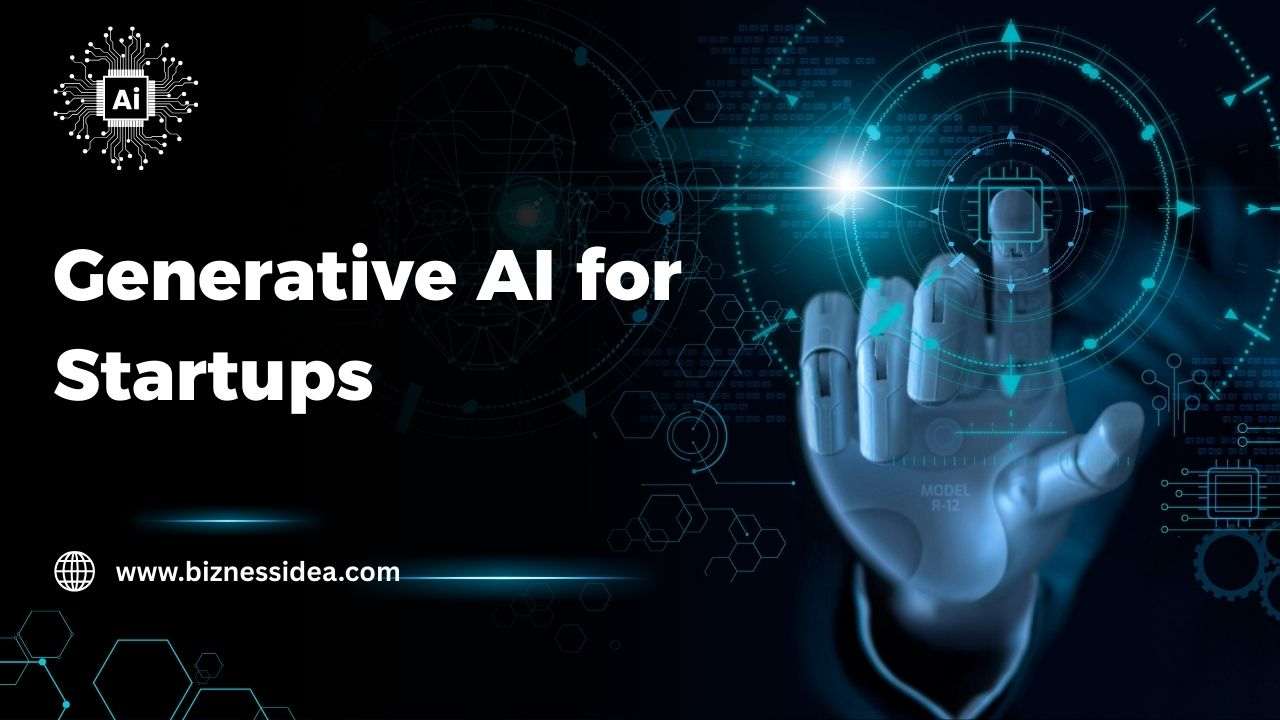Generative AI is more than a buzzword—it’s a transformational force reshaping how startups launch, operate, and scale. In 2025, startups are increasingly leveraging generative AI for startups to accelerate growth, reduce costs, and maintain competitiveness. This article explores what generative AI is, the benefits, real-world use cases, the best tools, and the future impact on entrepreneurship.
The AI Startup Revolution in 2025
AI is no longer confined to tech giants or big-budget labs. Today, even lean startups can harness their power. AI in business growth is accelerating. Startups can now automate routine tasks, generate content in seconds, and derive insights from data—all with minimal overhead. Founders are adopting generative AI for startups because it offers scalable solutions without needing large teams or coding expertise.
What Is Generative AI For Startups?
Generative AI refers to a type of artificial intelligence that can create new content—such as text, images, music, code, videos, or even entire conversations—by learning from existing data. Unlike traditional AI systems that are limited to analyzing or classifying data, generative AI produces original outputs that resemble human creativity. Traditional AI focused on classification and prediction, like spam filters or recommendation engines.
Generative AI, however, creates new content: text, images, or code. Common models include GPT-4, Claude, and Bard for text generation; DALL-E 3, Midjourney, and Stable Diffusion for images; and code-specific models for prototyping and automation. These models allow startups to prototype faster, communicate better, and automate creativity. These generative AI use cases for business are only growing.
Top Benefits of Using Generative AI for Startups
Generating blog posts, social copy, video scripts, and ad variations becomes nearly instant. It supports A/B testing and ensures consistency across channels, all without hiring large content teams. Founders and marketers can now ideate, test, and publish campaigns in a matter of hours instead of days or weeks. Additionally, AI-generated content can be localized for different demographics or adjusted for tone, boosting personalization and engagement.
- Automating Customer Support and CRM
AI chatbots powered by GPT-style models can handle FAQs, schedule demos, and even assist in lead qualification. This frees founders to focus on strategic tasks, while customer support scales automatically. Beyond just automating responses, AI-enhanced CRMs can analyze customer behavior, sentiment, and interaction patterns to offer more tailored and responsive service, improving retention and satisfaction.
- Product Prototyping & Idea Validation with AI Tools
Generative AI can draft UI mock-ups, copywriting, user flows, or even initial code snippets. This speeds up idea validation, enabling startups to iterate before spending on dev resources. Founders can create clickable demos or visual MVPs in hours, present them to users, gather feedback, and pivot, all in the early stages of development, significantly reducing the cost of failure.
- AI-Powered Business Planning & Forecasting
Thanks to AI assistants like Notion AI or Tome, founders can auto-generate financial models, SWOT analyses, investor decks, and market forecasts, saving hours and boosting accuracy. These tools allow founders to simulate various scenarios, prepare for investor Q&As, and stay data-driven even with limited internal expertise. AI can also help uncover blind spots or risks not immediately visible in traditional planning.
Real Use Cases of Generative AI For Startups
- AI in SaaS and Tech Startups
Startups in SaaS use AI to generate help center articles, code templates, and documentation. Some even offer AI-integrated features in their products, driving user value and retention.
- E-commerce Startups Using AI for Product Descriptions
E-commerce brands are automating product description writing at scale. AI rotates copy for SEO, localizes descriptions, and adapts tone per niche, speeding up product lifecycle and CRO.
- AI in Finance Startups—Risk Models & Reports
Fintech startups use generative AI to draft risk assessments, compliance reports, financial summaries, and customer-ready materials. This cuts resource requirements and speeds time-to-insight.
Best AI Tools for Startups in 2025
- Content & Marketing
The best use of AI is in content and marketing. With the help of AI, you can get the best script written for your content and can also get ideas related to the best strategies for marketing. Many platforms help in this work. Jasper, Copy.ai, and ChatGPT – Craft landing pages, email campaigns, ad copy, and blog content at scale.
- Design & Prototyping
If anything has to be designed, then the human mind takes a lot of time, and there is no guarantee that it will match the product, but if AI is used, then it can be very simple and easy to match the design related to the product, and it is attractive. Many such tools help in designing and prototyping as well.
- Business & Analytics
Nowadays, the use of AI is constantly increasing at every level in business, where business analytics is at the forefront. By using AI in business analytics, you can know the performance of the business and its standards. Many tools help in analyzing the business. Notion AI, Tome, Fireflies.ai: Automate meeting notes, generate strategic summaries, create investor-ready documentation, and parse large data sets.
Challenges That Startups Face While Using Generative AI
- Data privacy and accuracy
AI-generated content may contain hallucinations or errors, so it’s essential to fact-check information before shipping. The biggest challenge while using AI is user privacy, because AI mostly uses your data to improve itself; that is why it becomes very important to take care of safety measures while using AI.
- Overdependence on automation
Another big challenge is overdependence on the user or relying totally on AI. Because AI completes things very quickly and effectively, no user wants to do it for the sake of time, due to which they get all the work done by AI, which is a very big problem because it ends the thinking process and creativity of humans. Relying too heavily on AI risks dehumanizing your brand or missing strategic insight. Use AI for support, not strategy.
The Future of Startups with Generative AI
- Predictive AI in fundraising and investor matching
Startups will increasingly use predictive AI to not just track market trends but to analyze investor behavior patterns, identify the most suitable funding sources, and even forecast pitch success probabilities. Tools will help automate the research process, recommend optimal funding timelines, and generate investor outreach materials tailored to specific preferences. This will significantly enhance the chances of successful fundraising and minimize time wasted on cold outreach.
- Personalized AI co-founders
Shortly, founders may rely on highly trained AI models that act as personalized digital co-founders. These co-founders will offer real-time strategic advice, monitor KPIs, assist with brainstorming, and even help structure business models based on current trends and competitive insights. They won’t just execute tasks, they’ll think alongside humans, providing smart decision support.
These AI co-founders can be fine-tuned with a startup’s data and brand voice, making them capable of adaptive learning, decision-making, and continuous optimization. Their ability to simulate expert feedback on marketing, product, or finance will help solo entrepreneurs or lean teams scale faster without adding headcount, giving rise to a new kind of AI-human hybrid organization.
Conclusion
Integrated early, generative AI for startups enables speed, scale, and smarter decision-making. Founders who incorporate AI into core workflows, marketing, prototyping, customer support, and operations will build the next-gen businesses that define success in 2025 and beyond. Embrace AI now to stay ahead: faster execution, leaner teams, and unstoppable innovation.
For early-stage founders, the message is clear: adopt AI to stay lean, scale faster, and stay future-ready. As models evolve, the gap between AI-native startups and lagging competitors will only grow wider. Generative AI isn’t here to replace entrepreneurship; it’s here to empower it.
FAQs
Q1. Can AI replace startup employees?
Ans. No. AI excels at repetitive or creative tasks, but human vision, leadership, empathy, and strategy remain irreplaceable.
Q2. Is it expensive to integrate AI tools?
Ans. Many AI tools offer free or starter tiers. While enterprise integrations can be costly, early-stage startups can begin with affordable subscriptions ($20–$50/month per user).ṣ
Q3. What industries benefit most?
Ans. Industries with a content, analysis, or communications focus, like SaaS, marketing, ecommerce, finance, and edtech, are seeing the biggest gains from AI-powered startup solutions.













